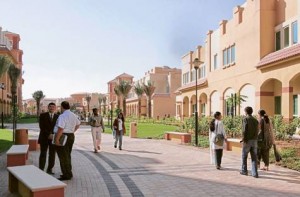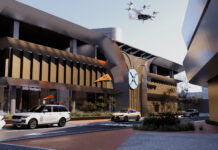By Amelia Naidoo, Campus Notes Editor www.gulfnews.com
Free Zone universities in Dubai have moved or expanded in Academic City, while Knowledge Village transforms into a human resources cluster

Three years ago Tecom Investments announced its plans to move all its free zone universities from Dubai Knowledge Village (DKV) to Dubai International Academic City (Diac) by 2011.
Two years later this goal has mostly been achieved with 17 universities having set up shop in Diac and in some cases establishing separate campuses in the education cluster, said Dr Ayoub Kazim, managing director of Tecom Investments’ Education Cluster.
He said the remaining 10 institutions have decided to remain in DKV, which is now establishing itself as a human resources hub.
Currently DKV has a selection of more than 450 human resource management, consultancy, training and personal development partners that include Gallup, Towers Watson, Hays, Hewitt and Innovative HR Solutions.
“We still have universities there [DKV] and we tend not to force them to go to Diac — it’s for them to consider it and it depends on their business model,” said Kazim.
Some universities have said “we are comfortable and we are not expanding” but Diac is the right zone to cater to their needs he continued.
The incentives to move to the education cluster that is further away from the city — though a two-hour drive even from remote locations in the UAE — are lower rentals and also a dedicated student hub that serves the student community said Kazim.
Institutions like Heriot-Watt University Dubai and BITS Pilani Dubai Campus have acquired large pieces of land in the Diac cluster to establish their own campuses. Heriot-Watt University Dubai campus is expanding to a Dh200 million new development set to open in September 2011 to accommodate a student body three times its current size. BITS Pilani moved from DKV to build its own campus on a 640,000 square foot plot of land in 2007.
DKV more suitable
The universities that have remained at DKV told Gulf News it was a more suitable location for their needs.
University of Wollongong in Dubai spokesman Raymi van der Spek said the institution will not be setting up another campus at Diac “and we have no intention to ever shift to Diac”.
“We regularly survey our student body on their expectations and desires with respect to our campus location and services. There continues to be strong support amongst the student body for our campus location at DKV,” he said.
The development of the Dubai Metro, together with a free Metro shuttle bus service, means that their current location is very convenient for most of its student body, van der Spek said. In addition a significant proportion of UOWD enrolled students are in part time post graduate programmes.
Middlesex University Dubai has been located in Block 16 in DKV since opening in 2005 and it, too, has no intention of leaving and has recently expanded to Block 17 for its 1,700 students with future expansion in store, said director Prof Raed Awamleh.
“Dubai International Academic City is indeed an attractive option location-wise, however, DKV is currently well suited to our students’ needs, and we intend to remain here for the foreseeable future.”
He added the close proximity to the Dubai Internet City and Dubai Media City provides internship and job opportunities for students and graduates in those business and creative communities.
The good facilities available, nearby residence halls and the Metro were also cited as reasons for staying.
DIAC/DKV figures
- 17 – universities currently in Dubai International Academic City (Diac)
- 10 – universities in Dubai Knowledge Village (DKV)
- 15,000 – students enrolled at Diac and DKV
- 450 – human resources related partners in DKV


















